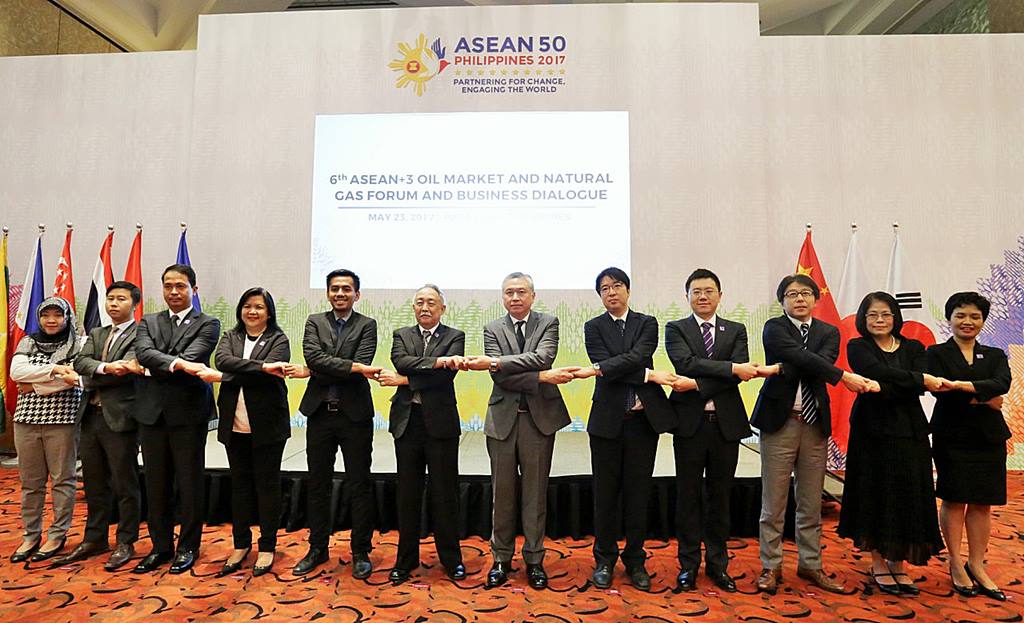
OIL AND GAS COOPERATION: DOE Undersecretary Cristino P. Posadas (6th from left) joins hands with (L-R) Country Coordinator I Putu Suarsana (Indonesia), Ministry of Energy and Mines-Department of Energy Policy and Planning-Technical Officer Phaysone Phouthonesy (Lao PDR), Director Htet Shan Phyo (Myanmar), DOE Assistant Director Rodela I. Romero (the Philippines), ASEAN Centre for Energy Technical Officer Septia Buntara Supendi, ASEAN Council on Petroleum Secretary in Charge Napporn Chuchinda, Research Fellow Jin Jo Park (South Korea), Deputy Director Lei Chen (China), Senior Policy Advisor Daizo Takayanagi (Japan), Ministry of Energy Director for International Energy Cooperation Dararat Ribonyakorn (Thailand) and Deputy Director Nguyen Phuong Mai (Vietnam) during the kick-off of the 3-day 6th ASEAN+3 Oil Market and Natural Gas Forum and Business Dialogue on May 23, 2017 at Sofitel Hotel, Pasay City.
(Pasay City, Philippines). The Philippines played host to the 3-day 6th ASEAN+3 (China, Japan, Korea) Oil Market and Natural Gas Forum and Business Dialogue on Tuesday at the Sofitel Hotel as the country deals with increasing domestic demand for fuel amid the declining supply of indigenous natural gas.
Department of Energy (DOE) Undersecretary Jesus Cristino P. Posadas, who represented DOE Secretary Alfonso G. Cusi, opened the forum conducted under the platform of Senior Officials Meeting on Energy (SOME) +3 and ASEAN Ministers on Energy Meeting (AMEM)+3. The forum aims to continue sharing knowledge and expertise, policy updates, best practices on oil and natural gas situation and developments among ASEAN+3 member countries.
Explaining the outlook of the Philippines in the oil and natural gas industries, Posadas told forum participants that the Philippines' natural gas supply from the Malampaya natural gas field is projected to last until 2024, making the country an emerging liquefied natural gas (LNG) market in Asia.
“We are working closely with legislators to facilitate the enactment of a law declaring energy projects as projects of national significance and for the Philippine Department of Energy to develop a program for LNG infrastructure,” Posadas said.
“We are also looking at LNG importation as an option to supplement or replace our local natural gas to ensure sustainable supply for power and eventually to non-power applications," Posadas added.
Annually conducted within the ASEAN+3 economies, the forum was held in the Philippines twice as the country hosted the same in 2013.
The forum sessions mainly focused on the updates of the oil and gas market situation and outlook, flexible and transparent LNG market for ASEAN, oil and gas business updates and oil and gas policy updates.
Representatives and other delegates actively participated in the roundtable discussion and open forum. They come from the government, national oil companies and business sector from Brunei Darussalam, Cambodia, Indonesia, Lao PDR, Malaysia, Myanmar, Singapore, Thailand, Viet Nam, China, Japan, and South Korea.
Also attending the event were representatives from the ASEAN Centre for Energy (ACE), ASEAN and the ASEAN Council on Petroleum (ASCOPE).
